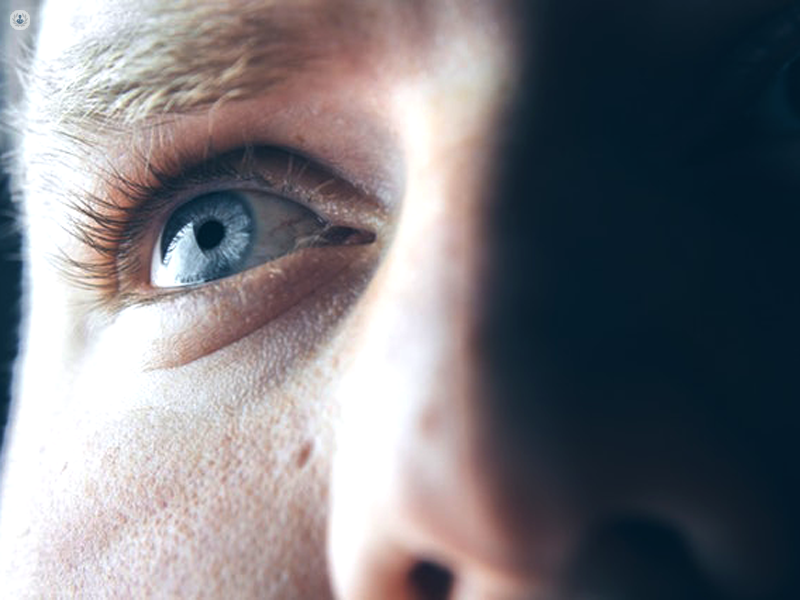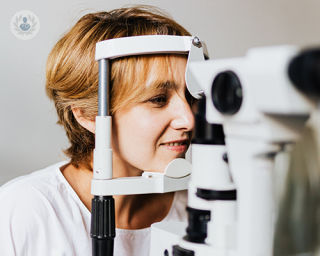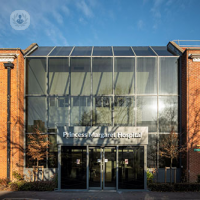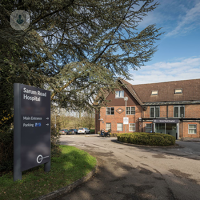What is diabetic retinopathy?
Diabetic retinopathy is a complication of diabetes that affects the eye and can severely damage vision, even causing blindness if left untreated. The retina is the layer of cells on the back wall of the inside of the eye. These cells, known as photoreceptor cells, are light-sensitive and can be divided into cones and rods.
Light enters through the front of the eye and is focused by the lens onto the retina, stimulating the cells, which triggers a nerve signal to be sent to the brain. The brain then forms an image, based on the signal sent from the retina, making the retina crucial to our ability to see.
To do its job, the retina needs a constant supply of blood to bring it oxygen and nutrients. If diabetes is not well-managed, the blood sugar level rises to dangerous levels, and one effect this can have is to cause the tiny blood vessels supplying the retina to bulge and leak and reduce the level of oxygen reaching the photoreceptor cells.

What are the symptoms of diabetic retinopathy?
Diabetic retinopathy usually causes no symptoms in the early stages, which means it often progresses enough to affect vision. When this happens, certain symptoms may manifest:
- Blurry vision
- Progressive loss of vision
- Floaters
- Shadows or missing areas of vision
- Difficulty to see during the night
- Soreness and redness in the eye
What is more alarming is that in some cases, it can progress without warning signs, so for diabetic patients it is important to have regular eye exams.
How does diabetes affect the eye?
Over time, a persistently high blood sugar level caused by diabetes can damage the blood vessels that supply the retina with oxygen and nutrients. There are three main stages to this:
- Background retinopathy – the capillaries in the eye develop tiny bulges and may leak slightly, but vision is largely unaffected.
- Pre-proliferative retinopathy – damage to the blood vessels becomes more pronounced, with significant bleeding into the eye.
- Proliferative retinopathy – scar tissue and new, fragile blood vessels develop on the retina as the body attempts to maintain the blood supply to the retina. However, these bleed easily, and cause vision loss.
The probability of suffering from diabetic retinopathy is greater if the patient:
- Has suffered diabetes for many years
- Has inadequate control of their blood glucose
- Smokes
- Suffers from high blood pressure
- Is obese
Can diabetic retinopathy be prevented?
To avoid diabetic retinopathy, it is essential for diabetic patients to keep their blood glucose, blood pressure and cholesterol under control. Smoking is strongly discouraged.
What is the treatment for diabetic retinopathy?
Patients suffering from the early form of the disease may not require treatment, although it is essential to manage diabetes and monitor the progression of the retinopathy.
For diabetic retinopathy that is affecting vision, the following treatments may be recommended:
- Laser treatment (photocoagulation) – a laser is used to treat the abnormal blood vessels at the back of the eye in proliferative retinopathy. It usually doesn’t improve vision, but can prevent the condition from worsening.
- Eye injections
- Vitrectomy – surgery to remove the vitreous humour (jelly-like substance that fills the eye), performed when there has been significant bleeding into the eye and it is also a useful technique to prevent retinal detachment.
Diabetic retinopathy
Mrs Kapka Nenova - Ophthalmology
Created on: 03-04-2013
Updated on: 10-30-2023
Edited by: Conor Lynch
What is diabetic retinopathy?
Diabetic retinopathy is a complication of diabetes that affects the eye and can severely damage vision, even causing blindness if left untreated. The retina is the layer of cells on the back wall of the inside of the eye. These cells, known as photoreceptor cells, are light-sensitive and can be divided into cones and rods.
Light enters through the front of the eye and is focused by the lens onto the retina, stimulating the cells, which triggers a nerve signal to be sent to the brain. The brain then forms an image, based on the signal sent from the retina, making the retina crucial to our ability to see.
To do its job, the retina needs a constant supply of blood to bring it oxygen and nutrients. If diabetes is not well-managed, the blood sugar level rises to dangerous levels, and one effect this can have is to cause the tiny blood vessels supplying the retina to bulge and leak and reduce the level of oxygen reaching the photoreceptor cells.

What are the symptoms of diabetic retinopathy?
Diabetic retinopathy usually causes no symptoms in the early stages, which means it often progresses enough to affect vision. When this happens, certain symptoms may manifest:
- Blurry vision
- Progressive loss of vision
- Floaters
- Shadows or missing areas of vision
- Difficulty to see during the night
- Soreness and redness in the eye
What is more alarming is that in some cases, it can progress without warning signs, so for diabetic patients it is important to have regular eye exams.
How does diabetes affect the eye?
Over time, a persistently high blood sugar level caused by diabetes can damage the blood vessels that supply the retina with oxygen and nutrients. There are three main stages to this:
- Background retinopathy – the capillaries in the eye develop tiny bulges and may leak slightly, but vision is largely unaffected.
- Pre-proliferative retinopathy – damage to the blood vessels becomes more pronounced, with significant bleeding into the eye.
- Proliferative retinopathy – scar tissue and new, fragile blood vessels develop on the retina as the body attempts to maintain the blood supply to the retina. However, these bleed easily, and cause vision loss.
The probability of suffering from diabetic retinopathy is greater if the patient:
- Has suffered diabetes for many years
- Has inadequate control of their blood glucose
- Smokes
- Suffers from high blood pressure
- Is obese
Can diabetic retinopathy be prevented?
To avoid diabetic retinopathy, it is essential for diabetic patients to keep their blood glucose, blood pressure and cholesterol under control. Smoking is strongly discouraged.
What is the treatment for diabetic retinopathy?
Patients suffering from the early form of the disease may not require treatment, although it is essential to manage diabetes and monitor the progression of the retinopathy.
For diabetic retinopathy that is affecting vision, the following treatments may be recommended:
- Laser treatment (photocoagulation) – a laser is used to treat the abnormal blood vessels at the back of the eye in proliferative retinopathy. It usually doesn’t improve vision, but can prevent the condition from worsening.
- Eye injections
- Vitrectomy – surgery to remove the vitreous humour (jelly-like substance that fills the eye), performed when there has been significant bleeding into the eye and it is also a useful technique to prevent retinal detachment.

Can the eyes show signs of diabetes?
By Mr Robert Longhurst
2024-11-21
Did you know that our eyes can actually display signs of diabetes? In our latest article, highly esteemed London-based consultant optometrist, Mr Robert Longhurst, tells us how exactly the eyes can show signs of diabetes, and what can happen if left untreated. See more


Diabetic retinopathy: facts and treatments
By Mr Maan Kasmiya
2024-11-21
Diabetic retinopathy (DR) is a complication of diabetes that affects the delicate part in the back of the eye (the retina). Learn from Mr Maan Kasmiya about this condition and its treatment. See more


Diabetic retinopathy: what are the stages?
By Mr Atul Bansal
2024-11-21
Have you recently been diagnosed with early diabetic eye disease? You may wonder practical things such as how it may progress and if you're still able to drive. We've asked our expert eye specialist Mr Atul Bansal this question and more so that you know how to manage your condition. See more


Can diabetic retinopathy be reversed?
By Ms Yvonne Luo
2024-11-21
In one of our latest articles here, highly reputable consultant ophthalmologist, Ms Yvonne Luo, describes in detail what diabetic retinopathy is, reveals the main causes, and tells us whether or not it can be reversed. See more
Experts in Diabetic retinopathy
-
Mr Mahi Muqit
OphthalmologyExpert in:
- Eye floaters
- Epiretinal membrane
- Diabetic retinopathy
- Vitrectomy
- Macular hole
- Retinal detachment
-
Mr Niaz Islam
OphthalmologyExpert in:
- Cataracts
- Chalazion
- Diabetic retinopathy
- Macular degeneration (AMD)
- Retina
- Watery eyes
-
Mr Jonathan Dowler
OphthalmologyExpert in:
- Intravitreal injection
- Retinal tear
- Epiretinal membrane
- Angiography
- Macular degeneration (AMD)
- Diabetic retinopathy
-
Professor Tom Williamson
OphthalmologyExpert in:
- Retinal detachment
- Macular hole
- Epiretinal membrane
- Diabetic retinopathy
- Cataracts
- Vitrectomy
-
Mr Praveen Patel
OphthalmologyExpert in:
- Macular degeneration (AMD)
- Retina
- Retinal vein occlusion
- Diabetic retinopathy
- Macular oedema
- Intravitreal injection
- See all

The Princess Margaret Hospital - part of Circle Health Group
The Princess Margaret Hospital - part of Circle Health Group
Osborne Rd, Windsor SL4 3SJ
No existe teléfono en el centro.
By using the telephone number provided by TOP DOCTORS, you automatically agree to let us use your phone number for statistical and commercial purposes. For further information, read our Privacy Policy
Top Doctors

Darwin Eye Consultants
Darwin Eye Consultants
Nuffield Health Shrewsbury Hospital, Longden Road
No existe teléfono en el centro.
By using the telephone number provided by TOP DOCTORS, you automatically agree to let us use your phone number for statistical and commercial purposes. For further information, read our Privacy Policy
Top Doctors

Sarum Road Hospital - part of Circle Health Group
Sarum Road Hospital - part of Circle Health Group
Sarum Rd, Winchester SO22 5HA
No existe teléfono en el centro.
By using the telephone number provided by TOP DOCTORS, you automatically agree to let us use your phone number for statistical and commercial purposes. For further information, read our Privacy Policy
Top Doctors
-
The Princess Margaret Hospital - part of Circle Health Group
Osborne Rd, Windsor SL4 3SJ, WindsorExpert in:
- Brachytherapy
- Cardiology
- General Surgery
- Orthopaedic surgery
- Robotic Surgery
- Dermatology
-
Darwin Eye Consultants
Nuffield Health Shrewsbury Hospital, Longden Road, ShrewsburyExpert in:
- Blepharoplasty
- Cataracts
- Eyelid surgery
- Oculoplastics surgery
- Laser eye surgery
- Complex eye conditions
-
Sarum Road Hospital - part of Circle Health Group
Sarum Rd, Winchester SO22 5HA, WinchesterExpert in:
- Vascular Surgery
- Cardiology
- Shoulder surgery
- Hand surgery
- General Surgery
- Orthopaedic surgery
- See all
- Most viewed diseases, medical tests, and treatments
- Genetic testing
- Minimal access surgery (keyhole surgery)
- Botulinum toxin (Botox™)
- Orthoptics
- Medicolegal
- Dermal fillers
- Headache
- Strabismus (squint)
- Glaucoma
- Diplopia (double vision)








